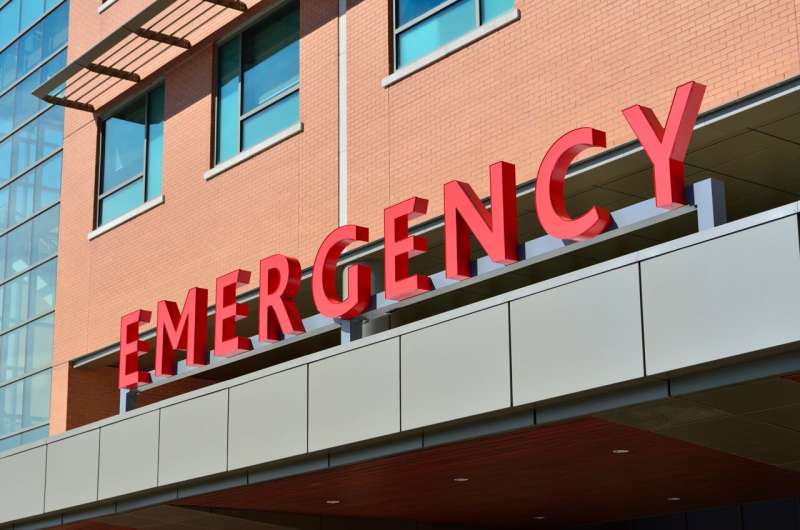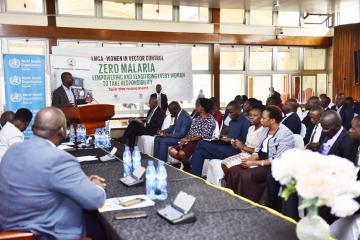
Credit: Pixabay from Pexels
Waiting more than 4 hours in emergency care for treatment is linked to heightened risks of death and a longer hospital stay for hip fracture patients, reveals a single center study, published online in Emergency Medicine Journal.
The waiting time for more than one in three of these patients exceeded the 4-hour national standard, which now requires that 76% of emergency department patients must either be discharged or admitted to hospital within that time frame.
By the age of 80, an estimated third of women and 17% of men will have fractured a hip—figures which are slated to likely double by 2033, explain the researchers.
Early surgery is associated with lower risks of death and perioperative complication rates, but with emergency department waiting times currently lengthening across the UK and elsewhere, it’s highly likely that hip fracture surgery may end up being delayed, they add.
To assess the potential impact on hip fracture patients of 4+ hour waits in the emergency department, the researchers retrospectively evaluated local hip fracture database entries for all patients aged at least 50, admitted to a single trauma center between 1 January 2019 and 30 June 2022, and subsequently monitored for at least eight months until February 2023.
The trauma center in question serves a population of 916,310 people in Lothian, Scotland and manages more than 1,000 hip fractures annually.
Details on demographics, treatment, progress through the service, and death were collected from the patients’ case notes and the trauma center’s documentation.
Some 3,611 patients were admitted to the center with a hip fracture during the study period. After various exclusions, including those with incomplete admission and discharge time data, 3,266 patients were included in the analysis.
Their average age was 81, but ranged from 50 to 104, and 2,359 (72%) were women. They spent an average of 3.9 hours in the emergency care department.
The average length of time before surgery was 27 hours, with the average time between admission and surgery 22.5 hours. The average length of their hospital stay was nine days, with subsequent follow-up lasting 529 days, during which time 1,314 (just over 40%) of these patients died.
In all, more than a third (1261; 39%) of patients waited longer than 4 hours in the emergency department. They were significantly more likely to be admitted during the winter, to pose more of a surgical risk, to have sustained a fracture that is more difficult to repair, and to have waited longer for their surgery than those who spent 4 hours or less in the emergency department.
Almost 96% of those who waited less than 4 hours were alive at 90 days compared with almost 93% for those waiting longer—equivalent to one additional death at 90 days for every 36 patients who waited more than 4 hours, say the researchers.
The 90 day risk of death rose in tandem with the length of delay before surgery, reaching around 14% after 24 hours.
Male sex, older age, admission during the winter months, higher operative risk, care home residence, and longer time between admission and surgery were also all independently associated with death at 90 days.
After taking account of potentially influential factors, a 4+ hour wait was associated with 29%, 36%, and 15% heightened risks of death at 60 days, 90 days, and at final check-up, respectively.
Patients who waited 4+ hours in the emergency department were also much more likely to spend one day longer in hospital, adding up to around £770,000 in total, if costed at £610/day (2014 prices), note the researchers.
This is an observational study, so cause can’t be confirmed. And the researchers acknowledge the relatively small size of their study and the lack of adjustment for the patients’ overall state of health and factors delaying their admission, all of which may have influenced their outcomes.
But while it isn’t clear exactly why spending more than 4 hours in the emergency department should be associated with poorer outcomes for hip fracture patients, given that there is a link, direct transfer to theater from the emergency department might improve the chances of survival for these patients, the researchers suggest.
More information:
Delayed admission of patients with hip fracture from the emergency department is associated with an increased mortality risk and increased length of hospital stay, Emergency Medicine Journal (2024). DOI: 10.1136/emermed-2023-213085
Citation:
4+ hour emergency care wait linked to heightened risks of death and longer hospital stay for hip fracture patients (2024, October 8)
retrieved 19 October 2024
from https://medicalxpress.com/news/2024-10-hour-emergency-linked-heightened-death.html
This document is subject to copyright. Apart from any fair dealing for the purpose of private study or research, no
part may be reproduced without the written permission. The content is provided for information purposes only.
Note: This article have been indexed to our site. We do not claim legitimacy, ownership or copyright of any of the content above. To see the article at original source Click Here








.png)




